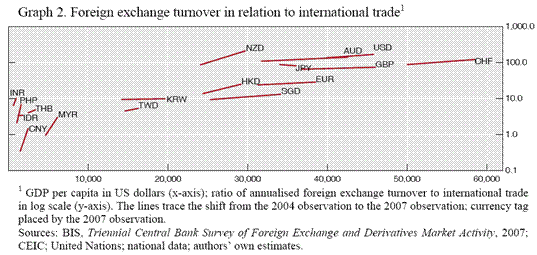From a paper written by Yin-Wong Cheung (UCSC), Guonan Ma (BIS), and Robert McCauley (BIS):
…Recent policies adopted by the Chinese authorities
can be interpreted as allowing the rest of the world to denominate debt in renminbi. But if trading
partners consider that the renminbi is subject to big jump risk, then prospects for its
internationalisation are weak. …
…And if trading partners dismiss the renminbi as simply the US
dollar with a greater or lesser trend appreciation, then prospects for its internationalisation are
also weak. We have presented evidence to suggest that these views are easily overstated, and that
therefore they understate the prospects for the internationalisation of the renminbi. …”
From the paper, a figure depicting the ratio of forex turnover to trade:

The authors observe:
Use of the renminbi to denominate bonds, official credits and trade could result in the
renminbi gaining as a currency in the foreign exchange market. There is ample room for the
renminbi to advance in this regard. Between 2004 and 2007, daily trading in the renminbi
expanded enough to surpass the sum of daily imports and exports from China (Graph 2). By
contrast, even the un-internationalised Indian rupee or the partially internationalised Korean won
traded 10 times as much as the sum of Indian or Korean international trade. And thoroughly
internationalised currencies trade 100 times as much. The renminbi has a long way to go.
If we ever denominate debt in renminbi, we are doomed.
If there’s one silver lining to Obama’s serial trillion-dollar deficits, it’s that they’re denominated in dollars which Zimbabwe Ben has absolutely no qualms about devaluing.
I doubt the CCP wants to supplant the dollar, except maybe a few marginal factions. They see the problems it has caused the US.
Hi I can’t find the link to this paper anywhere. Do you have it handy? Thanks.
One may wonder if the Vatican is going to undertake a change in its currencies exposure ?
External position of banks vis a vis all sectors P28 BIS statistical report Assets and liabilities
http://www.bis.org/statistics/rppb1004.pdf
How do we measure a country s risk sensitivity in term of currencies exposure, liquidities and liabilities to GDP ?
“VIVA STABILITY!”
May the most stable currency win – and it will!!!
JCR: Apologies. The link is now in the post. It is also here.
Thanks for the post Menzie.
I would only offer one comment from the peanut gallery… The rise of first the British Pound and later the American Dollar as preeminent reserve currencies, were the result of their economies having achieved high foreign trade volume, high positive foreign exchange balance and conservative fiscal policy. All of these factors are present in China. The biggest subject for debate is the speed of the Renminbi’s adoption in foreign trade…. I would guess that it will take about 20 years for it to capture 20% of total international trade. A process considerably accelerated by the over-leveraging of the British, American and European banking systems.
Anonymous,
Great Post!!
China’s fiscal policies are certainly far from “conservative,” unless you’re playing accounting games with obfuscating labels like ‘government’ and ‘local’.
Further, I would guess – nay, bet – that in 5 years talk of the Chinese currency supplanting the dollar (or “winning it all”) will be as out of fashion as it is in fashion today.